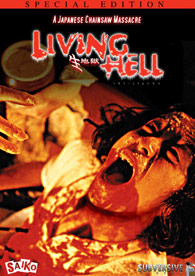

|
| home | movie reviews | features | sov horror | about | forum |
Living Hell C+
Year Released: 2000 (USA: 2004)
Billed as "a Japanese Chainsaw Massacre," Shugo Fujii's Living Hell doesn't have any chainsaws, but the psychological and physical torment of its hero often feels like Chainsaw's nightmarish dinner-table sequence stretched out ad nauseam. Wheelchair-bound 22-year-old Yasu (Hirohito Honda) is recovering from a mental breakdown when two distant relatives arrive to stay with his family. One is a pasty-faced elderly woman (Yoshiko Shiraishi) and the other is a pale, skinny girl about Yasu's age (Naoko Mori), both of whom never talk or display any recognizable human emotions -- and who always stand side by side, looking on with cold, dead stares. When Yasu's father and older siblings are at work during the day, the creepy duo is left alone to torture the helpless boy. The torture is mostly psychological at first (with things like buckets of live worms and beetles paving the way for shock treatment with stun guns and impromptu teeth-pulling without novocaine), and nobody believes Yasu that they're tormenting him. After all, he's recovering from that mental breakdown, so Yasu isn't quite well, his brother tells his sister. There's a scene early on that generates a kind of giddy anxiety: After breakfast, Yasu tries to leave the house before his sister (Rumi) steps out for work, lest he be left alone again with them. He frantically wheels to the front door, ready to jump into his outdoor wheelchair, only to discover that the wheels have been bent out of shape. He pleads with his sister to help him outside on his other set of wheels, but she rushes off with the cheerful assurance that his brother will fix it later. The film's pitch-black, taunting sense of humor is gleefully cruel -- and for a while there, Living Hell really had me. Unfortunately, Living Hell's fun sense of dread gets tripped up in an increasingly contrived plotline, numbing scenes of physical torture, and a last-act nosedive into absurdity. A subplot with a tabloid journalist (played by director Shugo Fujii) helps to reveal shocking family secrets, but we're usually a few steps ahead of our intrepid reporter, despite the sloppy plotting and far-fetched revelations. Once the final-act carnage begins, characters do increasingly stupid things in service of the plot -- like, say, plunging headlong into potential danger by sneaking into a house at night when calling the police would probably have been a better idea. Or searching that same dark house for a cell phone -- knowing that two maniacs are lurking about -- when you could have stepped out a window to get help. But I can forgive the Idiot Plot Syndrome if a film is effective in other ways, and as a crude low-budget shocker, Living Hell almost works. Although Fujii cribs most of his inspiration and style from other filmmakers, I enjoyed his film-school-geek enthusiasm. While the recreation of Texas Chainsaw's dinner-table sequence near the end surges so far over the top that I stopped caring about the story (actually, I probably stopped caring awhile before that, and poor Yasu's incessant whining had turned me against him long ago), the film's images continued to get under my skin, working on the level of an absurd, funny, maddening nightmare. Living Hell goes out with echoes of Sisters, Psycho, and Carrie, reminding us of the better films it owes its existence to -- and that despite his energy, Fujii still has a ways to go before he reaches the level of Hitchcock or De Palma. The Living Hell special-edition DVD is the first release from upstart fringe-cinema DVD company Subversive Cinema. It includes a commentary by writer-director Shugo Fujii, four of his short films, deleted scenes, storyboards, and a Fujii biography that reveals the difficult conditions under which Living Hell was made. In the bio, Fujii is quoted as saying the production really was "a living hell," like shooting "under the Japanese Roger Corman." The Japanese Dolby Digital Stereo track sounds fine (despite the lousy synth score), and it looks pretty good for a movie shot for about $100,000 in just nine days. As the flagship DVD release for Subversive Cinema, it's an encouraging harbinger of things to come. Review published 10.25.2004. Follow Michael Scrutchin on Twitter or Letterboxd.
|

|
| home | movie reviews | features | sov horror | about | forum |
| This site was previously at flipsidemovies.com from 2000 to 2008. |
|
contact | copyright | privacy | links | sitemap
Flipside Movie Emporium (FlipsideArchive.com)
|